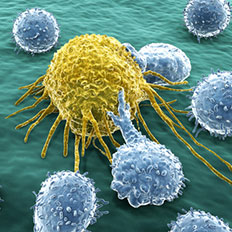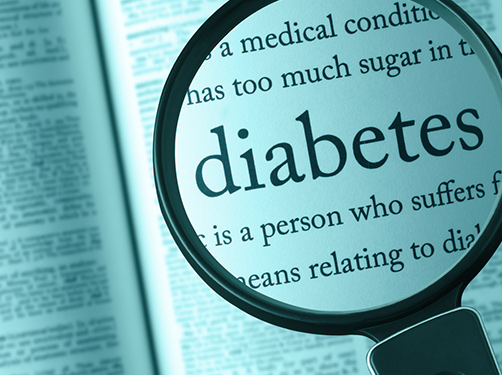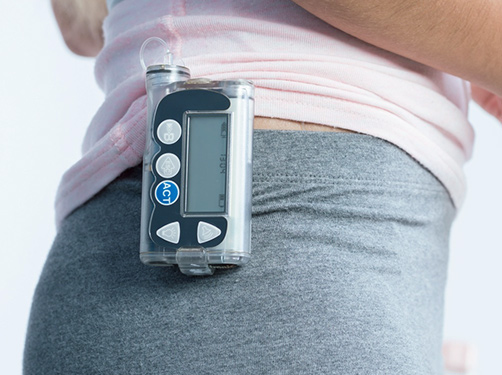Diabetes and cancer
Scientific support: Prof. Dr. Stephan Herzig
As has been shown in various scientific studies, there appears to exist a connection between the widespread diseases of diabetes and cancer. It applies especially to type 2 diabetes. The data surrounding type 1 diabetes is less clear.
The exact causes remain unknown. Science is working hard to decipher the underlying mechanisms to help develop suitable methods of treatment.
It is important for people with diabetes – and for those with a healthy metabolism – to regularly attend medical check-ups and have a healthy lifestyle.

Contents
- Diabetes and cancer – how are they connected?
- What types of cancer are more common in diabetes?
- What factors increase the risk of cancer?
- Can cancer trigger the onset of diabetes?
- How can cancer be prevented?
- Diabetes and cancer: What happens inside the body cells?
- Diabetes and cancer: What research approaches are there?
1. Diabetes and cancer – how are they connected?
The interaction between diabetes and cancer is highly complex and difficult to decipher. Both chronic diseases are influenced by a wide range of factors and can have very different characteristics. However, one thing appears to be certain: diabetes can promote the pathological growth of certain types of cells in the body and increase the risk of developing cancer.
Good to know:
Numerous studies point to a connection between type 2 diabetes and various types of cancer. However, the exact mechanisms are still not understood.
A 16-year long study with more than 1 million participants shows that various types of cancer were more common in people with diabetes than people with a healthy metabolism. The types of diabetes or the age at the time of diagnosis was not surveyed as part of this study. The majority of studies reporting on the connection between diabetes and cancer do not make a distinction between the different types of diabetes. Because type 2 diabetes is significantly more common than type 1 diabetes, it can be assumed that the findings predominantly apply to type 2 diabetes. However, there is an increasing number of studies suggesting that people with type 1 diabetes are also more likely to develop cancer. A key factor could be the daily insulin dose: A large U.S. population study showed that people who are required to inject at least 0.8 units of insulin per kilogram of body weight daily were more likely to develop cancer than insulin-dependent people with lower insulin doses. However, whether insulin could actually be a risk factor for cancer still needs further research.
2. What types of cancer are more common in diabetes?
As is the case in the population in general, some types of cancer are also more common in people with diabetes. These include colorectal cancer, liver cancer, breast cancer and pancreatic cancer, but also rarer types of cancer such as stomach cancer. For example, the risk of colorectal cancer in people with diabetes onset before age 50 is about the same as in families with a high incidence of colorectal cancer.
Regardless of gender, the following types of cancer are newly diagnosed more frequently in people with type 1 diabetes:
- Liver cancer
- Pancreatic cancer
- Kidney cancer
- Esophageal cancer
- Stomach cancer
- Lung cancer
- Thyroid cancer
- Squamous cell cancer
- Leukemia
Compared with the general population, however, it is interesting that the mortality after incident cancer in people with type 1 diabetes is not higher than that in people without diabetes. Studies show that breast cancer is even less common in people with type 1 diabetes than in the general population. However, this does not mean that type 1 diabetes protects against breast cancer. After all, the data on the risk of cancer in diabetes can only indicate that there is an interrelationship between the two diseases, but not that diabetes causes cancer.
Some types of cancer occur in people with type 2 diabetes as well as in people with type 1 diabetes. These include:
- Liver cancer
- Pancreatic cancer
- Kidney cancer
- Lung cancer
- Leukemia
However, there are still other types of cancer that are newly diagnosed more often in people with type 2 diabetes than in people without diabetes. These are:
- Tumors of the bile ducts
- Gallbladder cancer
- Gastrointestinal cancers
- Bladder cancer
- Ovarian cancer
- Uterine (endometrial) cancer
- Cancers of the oral cavity
- Gliomas (tumors of the central nervous system, predominantly brain tumors)
- Melanoma (skin cancer)
In general, women with diabetes mellitus suffer from the following types of cancer more frequently than women without diabetes:
- Colorectal cancer
- Pancreatic cancer
- Breast cancer (in type 2 diabetes)
Men with diabetes mellitus suffer from the following types of cancer more frequently than men without diabetes:
- Colorectal cancer
- Pancreatic cancer
- Liver cancer
- Non-Hodgkin lymphomas, malignant diseases of the lymphatic tissue (in type 1 diabetes)
However, the interrelationships between diabetes and cancer are by no means a one-way street: Some cancers (for example, pancreatic cancer) can also trigger the onset of diabetes. In addition, certain types of cancer medication can disrupt the sugar metabolism.
3. What factors increase the risk of cancer?
Cancer risk can be increased by a wide range of different factors. These include known risk factors such as:
- Certain genetic changes
- Smoking
- Overweight and obesity
- Lack of physical activity
- Unhealthy diet
- Certain infections, for example by the human papillomavirus (HPV)
- Alcohol consumption
- Environmental toxins
- Chronic inflammations
Overweight or obesity commonly accompanies type 2 diabetes. It is now known that fatty tissue releases hormones that promote tumor growth. Obesity is a chronic inflammatory state. The high number of inflammatory cells in the fatty tissue release inflammation-promoting messenger substances which may promote the onset of cancer.
Drugs can also increase the risk of developing cancer. These include, for example, immunosuppressants. But certain diabetes drugs are also suspected to increase the risk of developing cancer. These include GLP-1 receptor agonists and DPP-4 inhibitors, as well as insulin and insulin analogs. Sulfonylureas are also suspected of being a potential cause of cancer. However, whether diabetes medications are really involved in the onset of cancer is, in part, highly controversial in the scientific community: The studies to date have come to very different findings.
For supplied insulin, most studies showed an interrelationship between the daily insulin dose and cancer incidence: People who needed a high daily dose of insulin had a higher risk of developing cancer than people who needed little or no insulin. However, the studies did not consider other possible risk factors, so it is unclear to what extent the increased cancer risk must actually be attributed to the insulin administered.
Other blood sugar-lowering medications (oral antidiabetics, or OADs), on the other hand, are thought to have a positive effect on cancer. Treatment with metformin, for example, appears to reduce the incidence of new cases and mortality rate of cancer. So far, however, all that can be said is that cancer risk may decrease with metformin. The extent to which metformin can actually prevent cancer is still being researched. The effect on cancer risk also remains controversial among scientists.
It will probably take several years before it can be clarified whether certain diabetes medications increase the risk of cancer. The development of most types of cancer generally takes longer than the time these medications have been on the market and used in diabetes therapy. If such a risk does exist, the effects would only become evident later.
In addition to medications, metabolism in particular appears to increase the risk of cancer: If blood sugar levels are too high, the risk of cancer can increase. This also applies to prediabetes. In particular, the risk of colorectal cancer is increased in people with prediabetes compared with persons of the same age having a healthy metabolism.
4. Can cancer trigger the onset of diabetes?
Cancer diagnosis represents a severe break in the life of the persons affected. Such a diagnosis often requires surgery, chemotherapy, radiation, immunotherapy, or other medical treatments that can cause significant changes in the body. This can also result in diabetes. In most cases, however, it is not the cancer itself that is responsible for diabetes, but its treatment. For pancreatic cancer and other diseases of the pancreas, part or all of the pancreas is removed, if possible, or there is a loss of function due to the disease. This leads to a relative or absolute insulin deficiency, resulting in the development of diabetes.
However, chemotherapy may also be responsible for triggering the onset of diabetes. This does not mean that every person who receives chemotherapy will develop diabetes. Rather, only individual chemotherapies are known to increase the risk of developing diabetes. These include, for example, interferonalfa, tegafur-uracil (UFT), and paclitaxel. Glucocorticoids or other cortisone-like preparations can also raise blood sugar levels and promote diabetes in the long term – whether or not cancer is present. For this reason, glucocorticoids are always used for a short time only and in the lowest possible doses, with blood sugar levels being checked regularly. Targeted cancer therapies, for example antibody therapies or immunotherapies such as checkpoint inhibitors, can also increase the risk of developing diabetes. The reason why this applies to all of these therapies can only be explained to a limited extent so far.
It is important that blood sugar levels are checked regularly during and after cancer therapy. Especially during and in the first weeks to months after therapy with a checkpoint inhibitor, type 1 diabetes may very rapidly develop. Therefore, possible warning signs of type 1 diabetes should be discussed with the attending physicians in advance. If you detect signs of type 1 diabetes during or after therapy, contact your attending physicians immediately.
5. How can cancer be prevented?
A healthy lifestyle is important for everyone – with or without diabetes. Poor diet, lack of physical activity, and obesity are not only detrimental to diabetes treatment but also increase the risk of other diseases, such as cancer and cardiovascular complications. In contrast, healthy lifestyle with regular physical activity and a healthy diet has preventive properties and also improves the metabolism.
You can find more information, help and tips on a healthy lifestyle on our “Preventing diabetes” portal.
Good to know:
People with diabetes should regularly visit their doctor for check-ups and follow a healthy lifestyle.
In addition, people with diabetes should regularly attend cancer screenings, just like persons with a healthy metabolism do. The earlier a tumor is detected, the better the chance of successful treatment. For example, every insured person in Germany, from age 50 and above, can attend free regular early intestinal cancer screening. This includes an annual examination of the stool for hidden blood. In addition, colonoscopy is available to men from age 50 and above as well as women from age 55 and above. If it is unremarkable, the examination can be repeated after 10 years. Between the ages of 50 and 65, health insurers invite all insured persons in writing to do so. Appropriate screening programs (Link in German) are also available for other forms of cancer, such as breast or cervical cancer. If you have diabetes, talk to your attending physician to find out whether earlier monitoring is advisable. The Federal Ministry of Health offers an overview of the legally recognized early detection program (Link in German).
Since therapy with very high amounts of insulin is also suspected of promoting cancer, the German Diabetes Society (Deutsche Diabetes Gesellschaft, DDG) advises: as much insulin as necessary, but as little as possible. In contrast, therapy with the blood sugar-lowering drug metformin appears to have a protective effect in some cancers. Therefore, especially in severely overweight (obese) people with type 2 diabetes who inject high doses of insulin, physicians should consider combining it with metformin or other blood sugar-lowering medications to save insulin.
6. Diabetes and cancer: What happens inside the body cells?
How exactly diabetes contributes to the development of tumors is not yet clear. Several factors are under observation. It is suspected that elevated insulin levels (hyperinsulinemia) and elevated blood sugar levels (hyperglycemia) could be responsible.
The body elevates the insulin levels in the early stages of type 2 diabetes to counteract the decreasing effects of the hormone (insulin resistance of the body cells).
Insulin not only regulates the sugar levels in the body but also controls cell growth and cell division. Therefore, long-term elevation of insulin levels may stimulate the growth of preexisting tumor cells. Alongside insulin, insulin-like growth factor 1 is involved in the sugar and fat metabolism processes. It further stimulates cell division.
In addition to insulin, elevated blood sugar levels also play an important role. High blood sugar levels are associated with a higher risk of intestinal, liver, stomach, lung, and pancreatic cancers. This might possibly be attributed to what is called the “Warburg effect”. This effect describes an altered glucose metabolism in cancer cells, which allows tumors to grow rapidly. In addition, high blood sugar levels cause increased binding of sugar to various metabolites, resulting in advanced glycation end products (AGEs). These in turn increase oxidative stress in the body and have a pro-inflammatory effect.
Type 2 diabetes in particular is often associated with obesity. In the case of obesity, increased levels of certain messenger substances, known as adipokines, are released by the fatty tissue. These messenger substances, including the well-known leptin, do not only regulate appetite and metabolism but can also be directly involved in the cell division and cell growth processes. In addition, obesity causes more hormones such as estrogen to be released from the fat cells. Estrogen is a risk factor for breast cancer. At the same time, other hormones and messenger substances get out of balance more frequently in the case of obesity. These include adipokines and estrogen as well as cytokines. They are normally secreted more frequently to counteract infections, inflammations and tumors, but can also be elevated in obesity and have a pro-inflammatory effect.
7. Diabetes and cancer: What research approaches are there?
The coming years will be decisively influenced by research to try and decipher or disprove the possible connections between cancer and diabetes. Is one disease caused by the other or do both diseases simply have the same risk factors? Only when it has been definitively determined which direction the influence of each mechanisms takes can researchers begin to develop suitable treatments.
The long-term effects of diabetes medications are also being researched. If it is confirmed that certain substances increase the risk of cancer, this would have consequences for therapy in the future. Likewise, cancer therapies are closely monitored because they too can lead to the development of diabetes and other diseases.
Therapeutic options are also being researched: For example, researchers are investigating if bariatric surgery used to treat severe obesity (e.g., by reducing the size of the stomach) also inhibits the growth of tumors. As is already known, bariatric surgery can have a positive effect on type 2 diabetes and diabetes-related secondary diseases.
A relatively new approach is interval fasting which has shown very positive effects on the metabolism. Initial findings show that it can protect against tumor growth and improve the effectiveness of chemotherapy drugs.
Research also continues into exactly how overweight and obesity affect diabetes and contribute to the development of type 2 diabetes. While it is known that overweight and obesity promote prediabetes and type 2 diabetes, it is often not possible to find out why some people do not develop type 2 diabetes despite being overweight for decades.
The relatively new field of epigenetics offers new approaches to research the connections between diabetes and cancer. In contrast to genetics, the term epigenetics refers to the inheritance of traits that are not passed down through the DNA sequences of the genes but through the “packaging” of the genes. Chemical changes (methylation) to the DNA strand or its “packaging,” the histones, indirectly influence genetic information by controlling which genes can be read. Environmental factors, diet, and life circumstances are all possible triggers for epigenetic changes.
In addition to epigenetic changes, there are other factors that control how many times which genes are read, for example transcription factors. They are necessary for genes to be read at all. Their function is also influenced by diet, environmental factors, medications and living circumstances. This subject is being extensively researched, especially with regard to medications.
Sources:
Akturk, H. A. et al.: Immune checkpoint inhibitor-induced Type 1 diabetes: a systematic review and meta-analysis. In: Diabetes Medicine, 2019, 36: 1075-1081
Butler, A. E. et al.: Marked Expansion of Exocrine and Endocrine Pancreas with Incretin Therapy in Humans with increased Exocrine Pancreas Dysplasia and the potential for Glucagon-producing Neuroendocrine Tumors. In: Diabetes, 2013, 62: 2595-2604
Carstensen, B. et al.: Cancer incidence in persons with type 1 diabetes: a five-country study of 9,000 cancers in type 1 diabetic individuals. In: Diabetologia, 2016, 59: 980-988
Coughlin, S. S. et al.: Diabetes mellitus as a predictor of cancer mortality in a large cohort of US adults. In: Am J Epidemiol, 2004, 159: 1160-1167
Currie, C. J. et al.: Mortality after incident cancer in people with and without type 2 diabetes: Impact of metformin on survival. In: Diabetes Care, 2012, 35: 299-304
Currie, C. J. et al.: The influence of glucose-lowering therapies on cancer risk in type 2 diabetes. In: Diabetologia, 2009, 52: 1766-1777
Dai, X. et al.: Altered profile of serum microRNAs in pancreatic cancer-associated new-onset diabetes mellitus. In: J Diabetes, 2016, 8: 422-433
Delaunay, F. et al.: Pancreatic beta cells are important targets for the diabetogenic effects of glucocorticoids. In: J Clin Invest, 1997, 100: 2094-2098
Giovannucci, E. et al.: Diabetes and cancer: A consensus report. In: Diabetes Care, 2010, 33: 1674-1685
Gordon-Dseagu, V. L. Z. et al.: Epidemiological evidence of a relationship between type‐1 diabetes mellitus and cancer: A review of the existing literature. In: Int J Cancer, 2013, 132: 501-508
Hemkens, L. G. et al.: Risk of malignancies in patients with diabetes treated with human insulin or insulin analogues: a cohort study. In: Diabetologia, 2009, 52: 1732-1744
Keesari, P. R. et al.: S141 Long-term risk of colorectal cancer in patients with prediabetes: a systematic review and meta-analysis. In: Am J Gastroenterol, 2022, 117: e103
Khan, U. A. et al.: Personal History of Diabetes as Important as Family History of Colorectal Cancer for Risk of Colorectal Cancer: A Nationwide Cohort Study. In: Am J Gastroenterol, 2020, 115: 1103-1109
Kooijman, R.: Regulation of apoptosis by insulin-like growth factor (IGF)-I. In: Cytokine Growth Factor Rev, 2006, 17: 305-323
Krebsinformationsdienst: Krebsvorsorge und Krebsfrüherkennung – eine Übersicht. (Letzter Abruf: 01.06.2023)
Krebsinformationsdienst: Darmkrebs-Früherkennung. (Letzter Abruf: 01.06.2023)
Kuo, T. et al.: Regulation of Glucose Homeostasis by Glucocorticoids. In: Adv Exp Med Biol, 2015, 872: 99-126
Lauby-Secretan, B. et al.: Body Fatness and Cancer - Viewpoint of the IARC Working Group. In: N Engl J Med, 2016, 375: 794-798
Longo, V. D. et al.: Fasting: molecular mechanisms and clinical applications. In: Cell Metab, 2014, 19: 181-192
Moses, A. C. et al.: Recombinant Human Insulin-Like Growth Factor I Increases Insulin Sensitivity and Improves Glycemic Control in Type II Diabetes. In: Diabetes, 1996, 45: 91-100
National Cancer Institute: Obesity and Cancer Risk. (Letzter Abruf: 01.06.2023)
Nolde, E.: Erst Krebs, dann Diabetes? Endokrinoe Nebenwirkungen mit fulminantem Verlauf. In: Diabetes Update, 2020 (Letzter Abruf: 01.06.2023)
Rahman, I. et al.: Type 2 diabetes, obesity, and cancer share some common and critical pathways. In: Front Oncol, 2020, 10: 600824
Roy, A. et al.: Diabetes and pancreatic cancer: exploring the two-way traffic. In: World J Gastroenterol, 2021, 27: 4939-4962
Ryu, T. Y. et al.: Hyperglycemia as a risk factor for cancer progression. In: Diabetes Metab J, 2014, 38: 330-336
Sah, R. P. et al.: New insights into pancreatic cancer-induced paraneoplastic diabetes. In: Nat Rev Gastroenterol Hepatol, 2013, 10: 423-433
Schmidt, F. M. et al.: Inflammatory cytokines in general and central obesity and modulating effects of physical activity. In: PLoS One, 2015, 10: e0121971
Schlesinger, S. et al.: Prediabetes and risk of mortality, diabetes-related complications and comorbidities: umbrella review of meta-analyses of prospective studies. In: Diabetologia, 2022, 65: 275-285
Sciacca, L. et al.: Long-acting insulin analogs and cancer. In: Nutr Metab Cardiovasc Dis, 2018, 28: 436-443
Shikata, K. et al.: Diabetes mellitus and cancer risk: review of the epidemiological evidence. In: Cancer Sci, 2013, 104: 9-14
Sona, M. F. et al.: Type 1 diabetes mellitus and risk of cancer: a meta-analysis of observational studies. In: Jpn J Clin Oncol, 2018, 48: 426-433
Tseng, C.-H.: The relationship between diabetes mellitus and gastric cancer and the potential benefits of metformin: an extensive review of the literature. In. Biomolecules, 2021, 11: 1022
Vigneri, P. et al.: Diabetes and cancer. In: Endocr Relat Cancer, 2009, 16: 1103-1123
Wang, C. et al.: Increased risk of hepatocellular carcinoma in patients with diabetes mellitus: a systematic review and meta-analysis of cohort studies. In: Int J Cancer, 2012, 130: 1639-1648
Zhang, Z.-J. et al.: The prognostic value of metformin for cancer patients with concurrent diabetes: a systematic review and meta‐analysis. In: Diabetes Obes Metab, 2014, 16: 707-710
Zhao, H. et al.: Sulfonylurea and Cancer Risk Among Patients With Type 2 Diabetes: A Population-Based Cohort Study. In: Front Endocrinol (Lausanne), 2022, 13: 874344
Zhong, W. et al.: Daily insulin dose and cancer risk among patients with type 1 diabetes. In: JAMA Oncology, 2022, 8: 1356-1358
Zhu, B. et al.: The relationship between diabetes mellitus and cancers and its underlying mechanisms. In: Front Endocrinol, 2022, 13: 800995
As of: 01.06.2023






